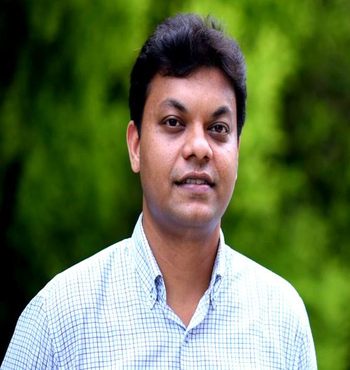
Dr. Biman B Mandal
Associate Professor, IIT Guwahati
NASI-SCOPUS YOUNG SCIENTIST AWARD in Medicine
About the Speaker
Dr. Biman B. Mandal is an Associate Professor at Department of Biosciences and Bioengineering, Indian Institute of Technology Guwahati (IITG) and a visiting faculty at Gauhati University and University College London (UCL). His group is working on Tissue Engineering, Biomaterials and Stem cells towards developing a number of affordable healthcare products. Dr. Mandal received his Ph.D from IIT Kharagpur and completed his Post Doctoral Research at Tufts University, Boston, USA. Dr. Mandal has published 61 highly referred articles in best flagship journals of PNAS, Scientific Reports, Biomaterials, Tissue Engineering, Biotechnology & Bioengineering. He is an elected member of the National Academy of Sciences, India and recipient of numerous awards including NASI-SCOPUS Young Scientist Award 2016 in Medicine, INSA-MEDAL for Young Scientist 2015 and Gandhian Young Technological Innovation Award (GYTI-2014).
Title of the Talk
"LAB GROWN HUMAN TISSUES: THE WAY FORWARD".
Every year, millions of patients suffer loss or failure of an organ or tissue as a result of accidents or disease. Tissue or organ transplantation is a commonly accepted norm under these circumstances. However, constant shortage of donor tissue and organ transplants coupled with high morbidity and mortality has spurred great interest for lab grown tissues/organs as promising substitute. Recent scientific advancement in biomaterials, stem cells in combination with biomimetic environments have made this possible through tissue engineering. In a tissue engineering approach, fabricated or bioprinted polymeric 3D scaffold imitates the native tissue/organ it is replacing, while also providing a temporary functional support for the residing cells. In comparison to synthetic, biologically derived polymeric scaffolds being natural, biodegradable and biocompatible offer resident cells a wide variety of biofunctional motifs that help to regulate cell adhesion, proliferation, phenotype, matrix production and enzyme activity. In our laboratory at IIT Guwahati, we utilize silk as a natural model biopolymer to fabricate various tissue forms to study and understand the mechanisms related to cell-surface interactions, stem cell differentiation towards functionality. In my presentation, I would discuss our recent findings to reconstruct native tissues/organs including smart human skin, cornea, intervertebral disc, engineered bone, cartilage, blood vessel, bioartificial pancreas, injectable hydrogels for drug delivery etc. I will also briefly share our latest outcomes using 3D bioprinting technology. Findings from these studies have very important implications in relation to development of artificial tissues and grafts towards future in vivo human transplantation.